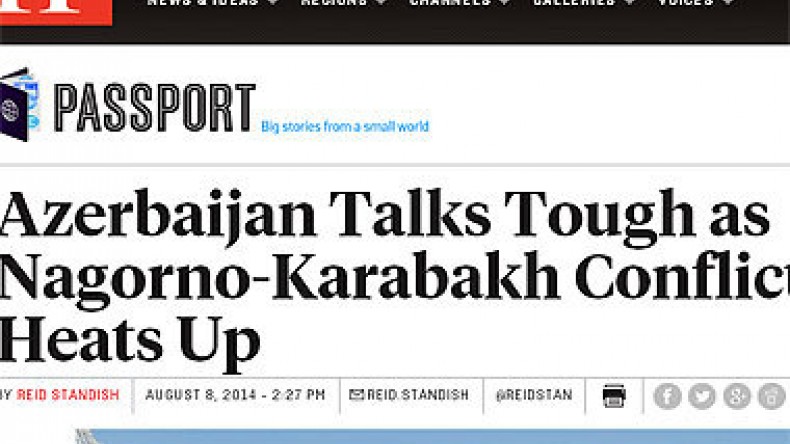
Foreign Policy Centre: Azerbaijan tries to justify its rejection of democratization by existence of Karabakh conflict
The British think-tank center “Foreign Policy Centre” the Representation of the European Commission in the UK, with the support of the Universities of Birmingham and Edinburgh have presented a joint report entitled “Trouble in the neighbourhood? The Future of the EU’s Eastern Partnership”, which points out that Azerbaijan has not fully used the opportunities given to him. It has especially failed in democracy, the rule of law, human rights, sustainable economic development and in the fight against corruption.
In the section dedicated to Azerbaijan President Ilham Aliyev clearly stated at the World Economic Forum in Davos that Azerbaijan wants to avoid signing an Association Agreement with the EU. Instead Baku has proposed a Strategic Modernization Partnership (SMP) that would further develop economic relations and would not put responsibilities on the government to develop democracy.
SMP is a simple postponement of democratization, rule of law, human rights and fundamental freedoms Tural Abbasov, a researcher at the Center for Economic and Social Development, writes in the report.
“Many experts believe that if an SMP is adopted, Azerbaijan’s democratisation process will be postponed for an unknown period of time. Therefore an SMP does not serve the interests of Azerbaijani citizens, rather it will strengthen the oppressive oligarchic interests of the government of Azerbaijan. It will be the ‘Azerbaijani way of modernisation’ which merely simulates a fight against corruption and monopoly. Therefore, the EU should not sign a Strategic Modernisation partnership with Azerbaijan,” the report reads.
The author points out that Azerbaijan has recently finished its six month chairmanship of the Committee of Ministers of the Council of Europe. During this time, the government has taken restrictive steps to silence opposition voices but the restrictions started after the Presidential election in 2013. New amendments were adopted to the law concerning NGOs by the Parliament of Azerbaijan on 17th December 2013. The Central Bank of Azerbaijan changed its instructions on the withdrawal of grants which are not registered by the Ministry of Justice and from April 2014 the bank accounts of many independent NGOs were blocked. President Ilham Aliyev also signed more amendments which would give the government the authority to temporarily suspend or permanently ban national or international NGOs. Following the European Parliament’s resolution on the violation of human rights in Azerbaijan, the Azerbaijani Parliament criticised the resolution and announced that they will re-consider their relations with the European Parliament.
Azerbaijan first applied to become a member of the WTO in 1997. However, the accession process to enter the WTO has proceeded very slowly. There is has been little success on bilateral negotiations with bilateral talks with big economies such as the U.S., EU, Japan, Brazil and Australia still pending. The reason why the accession process is going very slowly is because there is not the political will which could push for more effective negotiations. Since Azerbaijan is not a member of the WTO, it is not very difficult to say that the country will not sign an Association Agreement with the EU.
According to the report, Baku wants the EU’s active involvement in conflict resolution between Azerbaijan and Armenia over Nagorno Karabakh and often criticises the EU for having double standards. The EU has long maintained a balanced relationship with both Azerbaijan and Armenia. Baku wants EU involvement in conflict resolution and for it to take the same approach towards Azerbaijan as it does for Moldova, Georgia and Ukraine. Baku justifies EU involvement in the resolution of the Nagorno Karabakh conflict with two major arguments: First, the conflict is a big threat to the security of energy flows from Azerbaijan to Europe; Second, since the EaP promotes multilateral relationships among the partner countries, the Nagorno Karabakh conflict creates problems for deeper relations between the EU and Azerbaijan.
The report reads that since 1991 the EU has provided Azerbaijan with 500 million AZN in funding to improve the socio-economic situation of the country. The EU is still the main international donor to the government and civil society, however, the law on NGOs and repressive steps of the state and attempts to hamper the effectiveness of the aid of EU.
“Azerbaijan does not want to start a democratisation process or promotion of human rights, arguing that, first and foremost, Azerbaijan needs to settle its NagornoKarabakh conflict,” the author notes.
Newsfeed
Videos






























